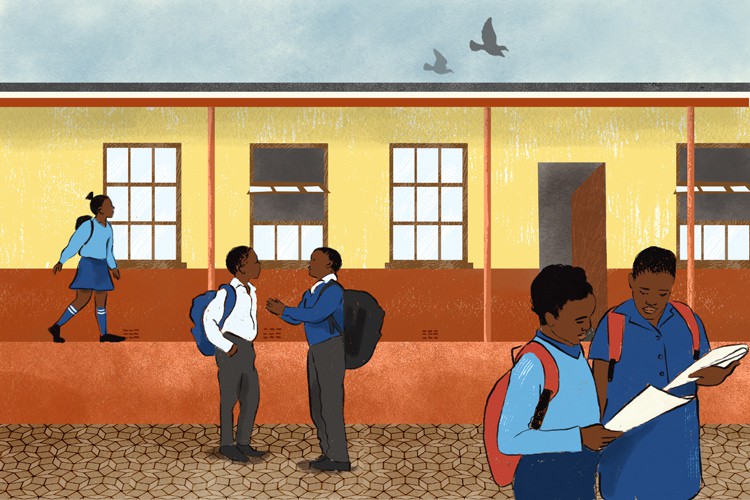Researchers call for full reopening of schools after report shows more than half of children miss meals
The total lost days of meals could be as high as 133 out of 211 school days
Illustration: Lisa Nelson
- There have been four surveys conducted by NIDS-CRAM to assess the country’s socio-economic conditions during the Covid-19 pandemic.
- One of the findings is that 57% of children had missed a school meal in the past seven days, despite a court order that the education department must roll out its nutrition programme to children on their days not attending school.
- The survey also found that 72% of adults living with children reported that their “households had run out of money to buy food the month prior to being interviewed in at least one of the four waves of NIDS-CRAM”.
Fewer than half of children received school meals from the National School Nutrition Programme (NSNP) this year while schools were open.
This is one of the findings of the fourth set of results from the National Income Dynamics Study - Coronavirus Rapid Mobile Survey (NIDS-CRAM) released on Wednesday.
The study looked at the changes in education during the Covid-19 pandemic and focused on school attendance and school feeding, and was based on the responses by 5,629 people from surveys conducted between 2 February and 10 March 2021.
NIDS-CRAM researchers asked parents whether their children had received a school meal within the last seven days. Restricting this to the days when schools were open and children could receive meals, 43% of parents said yes.
The survey found that 72% of adults living with children reported that their “households had run out of money to buy food the month prior to being interviewed in at least one of the four waves of NIDS-CRAM”. In 32% of households, a child went hungry at least once in the week before in at least one of the four waves of the study.
The parents interviewed in the survey said that rotating timetables was the main reason for children not receiving school meals. These disruptions to school attendance led to further interruptions in learner access to school meals.
In 2020, the overall school year was reduced from 198 days to 156 days, and this year school reopening was delayed by nearly two weeks. During these periods of school closure and delays in reopening, many learners were not provided with school meals, the researchers found.
Speaking at the launch of the survey, the Department of Basic Education’s Nompumelelo Mohohlwane said, “At least 55 days of school meals were lost between March 2020 and March 2021 due to no schooling if you compare the overall number of school days in 2019 to 2020.”
“However, these estimated days do not include diminished meal access affected by rotational attendance and 55 days of lost meals is likely to be an underestimate,” she said.
In July 2020 the North Gauteng High Court ruled that the Department of Basic Education must roll out the National School Nutrition Programme (NSNP) to all nine million qualifying learners, whether or not they were attending school.
The court also granted a supervisory order – that the education minister and eight MECs (in all provinces except the Western Cape which had already committed to feed learners, in or out of class) report back to the court on progress.
While learners were allowed to come to school for meals even on days they were not attending school, the report estimates that the total lost days of meals could be as high as 133 out of 211 school days.
In a report by Education Director-General Mathamzima Mweli, at least 1.5 million learners were still not receiving their meals at March 2021.
According to a joint statement by Equal Education (EE), Equal Education Law Centre and SECTION27, some provincial education departments had repeatedly failed to report on whether they are effectively rolling out NSNP, despite the court order.
They said they had received the last round of monitoring reports from the education department — and from the Education MECs of KwaZulu-Natal, North West, Northern Cape and Mpumalanga — after the court deadline of 19 March 2021. The reports from the Eastern Cape, Free State, Gauteng and Limpopo were not submitted at all.
“This is an unbelievable and terrible neglect of responsibility that allows children to go hungry. This is an ongoing violation of children’s rights, and barriers to learners’ getting the school meals they are entitled to must be fixed urgently,” the statement read.
To prevent the further decline of learner access to school meals, NIDS-CRAM researchers are recommending the return to full-time school attendance.
“The issues at stake are critical. While international evidence initially recommended school closure and responses by the government used the best evidence available, there is now a strong case for going back to full-scale school attendance,” Mohohlwane said.
Support independent journalism
Donate using Payfast

Don't miss out on the latest news
We respect your privacy, and promise we won't spam you.
© 2021 GroundUp. This article is licensed under a Creative Commons Attribution-NoDerivatives 4.0 International License.
You may republish this article, so long as you credit the authors and GroundUp, and do not change the text. Please include a link back to the original article.
We put an invisible pixel in the article so that we can count traffic to republishers. All analytics tools are solely on our servers. We do not give our logs to any third party. Logs are deleted after two weeks. We do not use any IP address identifying information except to count regional traffic. We are solely interested in counting hits, not tracking users. If you republish, please do not delete the invisible pixel.

